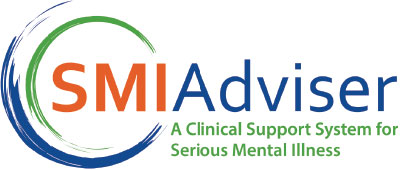SMI Adviser to Bring Hands-On Learning to Annual Meeting
Abstract
SMI Adviser Learning Labs offer hands-on, immersive learning about the experience of psychosis and administration of long-acting injectables, while educational sessions teach participants about integration of patients with serious mental illness (SMI) into the community, de-escalation techniques during a crisis, and use of clozapine.

SMI Adviser, the Clinical Support System for Serious Mental Illness funded by the Substance Abuse and Mental Health Services Administration (SAMHSA) and administered by APA, is sponsoring Learning Labs and other educational sessions at this year’s Annual Meeting. The labs and sessions are designed for mental health professionals who treat patients with schizophrenia, bipolar disorder, and major depression.
The following two SMI Adviser Learning Labs offer practical skills that practitioners can apply to their patient care:
Supporting Person-Centered Care: A Simulation of Hearing Voices: This learning lab is based on The Hearing Distressing Voices simulation, developed by Pat Deegan and designed by people who hear voices themselves. It is a groundbreaking, empathy-building experience that helps mental health professionals enhance their understanding of the challenges and strengths of people who experience psychosis, particularly auditory hallucinations. Participants will listen to an audio recording that simulates the experience of hearing voices while engaging in several set activities typical to community care, emergency room, and day treatment settings. Experienced and new practitioners have found the impact of this lab to be profound. After the simulation, participants will discuss the experience with a special focus on working with people who hear distressing voices.
Long-Acting Injectables for SMI: Preparation and Administration: Long-acting injectable (LAI) antipsychotics are a crucial option for patients in the treatment of schizophrenia, improving compliance and long-term recovery. Yet not everyone feels comfortable administering LAIs. During this learning lab, attendees will watch colleagues and experts prepare and administer the injections and will have the opportunity to practice injecting mannequins at four sites: deltoid, ventral gluteal, dorsal gluteal, and the abdomen.
SMI Adviser will also offer these educational sessions about topics relevant to evidence-based care for SMI:
Meaningful Community Participation: An Essential Aspect of Recovery for Persons With Serious Mental Illness: The passage of the Community Mental Health Act in 1963 and the ensuing deinstitutionalization movement marked the start of an era focused on the integration of people with SMI into community settings. Yet the actual integration of SMI patients in mainstream community activities was limited, and patients have often experienced profound social isolation. In recent years, a growing body of literature has emerged demonstrating that full community participation is associated with positive health outcomes and improved quality of life. And robust research findings on the negative influence of loneliness on overall health are now widely recognized. Meaningful community participation has since been identified by SAMHSA as an essential dimension of recovery from SMI. This session will provide an overview on how to promote community inclusion for persons with SMI from a variety of perspectives.
How to Safely Manage High-Level Escalations: Applied Engagement Skills While Intervening in Crisis Situations: Crisis intervention or de-escalation refers to a set of responses that can be employed to avoid a potential crisis from occurring or to lessen the impact caused by a crisis. These interventions are designed to address the emotional, psychological, and social needs of individuals with SMI involved in the escalating situation and facilitate a return to a pre-crisis level of functioning. This training aims to identify the traits and dynamics of the different stages of a crisis to help responders assist individuals in crisis and other individuals involved and will highlight four essential skills: nonverbal communication, active listening, awareness of power struggles, and engagement strategies.
Clozapine 101: Everything You Need to Know to Start a New Patient on Clozapine: Despite being the only pharmacologic treatment approved by the Food and Drug Administration for treatment-resistant schizophrenia, clozapine remains widely underutilized in the United States and in many parts of the world. Barriers for clozapine’s underutilization include patient concern about its side effects, mandated hematologic monitoring, administrative requirements associated with the Clozapine Risk Evaluation and Mitigation Strategy (REMS), and prescriber reluctance. The session is designed to help prescribers feel more comfortable using clozapine. Attendees will leave the session empowered to identify appropriate candidates who may benefit from clozapine and pursue a clozapine trial with confidence.
Annual Meeting attendees should look for the SMI Adviser Booth located near the Mental Health Innovation Zone adjacent to the Exhibit Hall in the Moscone Center.
SMI Adviser works closely with a team of experts in clinical care, family engagement, digital health, health systems, lived experience, and more, all working to create access to the best resources on serious mental illness. ■
Resource
The dates and times of the sessions can be found in the APA Meetings App or the program guide distributed on site. Information about SMI Adviser is posted at https://smiadviser.org/.
The SMI Adviser app can be downloaded to a smartphone at https://smiadviser.org/getapp.



